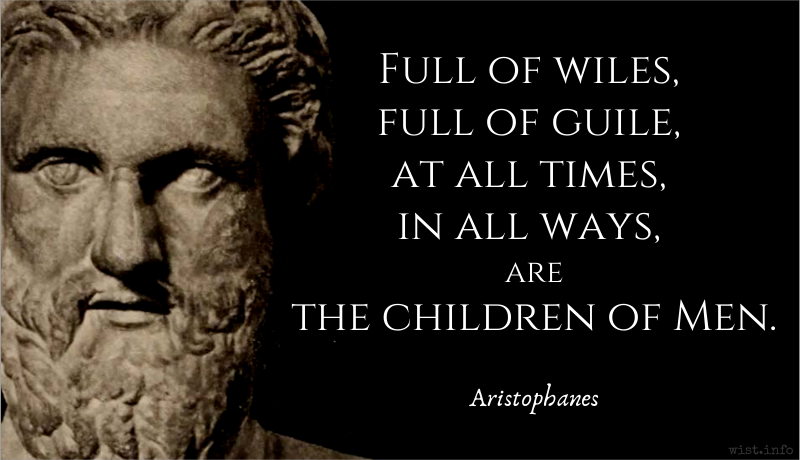I always fear less a dull man who is naturally strong
Than someone who is weak and clever.
[ἀεὶ γὰρ ἄνδρα σκαιὸν ἰσχυρὸν φύσει
ἧσσον δέδοικα τἀσθενοῦς τε καὶ σοφοῦ.]Euripides (485?-406? BC) Greek tragic dramatist
Bellerophon [Βελλεροφῶν], frag. 290 (TGF) (c. 430 BC) [tr. @sentantiq (2015)]
(Source)
Barnes frag. 51, Musgrave frag. 11. (Source (Greek)). Alternate translations:
By far less dangerous I esteem the fool
Endued with strength of body, than the man
Who's feeble and yet wise.
[tr. Wodhull (1809)]
I always fear a stupid if bodily powerful man less than one who is both weak and clever.
[tr. Collard, Hargreaves, Cropp (1995)]
Always I fear an unintelligent but naturally strong man less than a weak and clever one.
[tr. Stevens (2012)]
I fear less the powerful but stupid
than the weak and cunning.
[Source]
Quotations about:
cunning
Note not all quotations have been tagged, so Search may find additional quotes on this topic.
None speak of the bravery, the might, or the intellect of Jesus; but the devil is always imagined as a being of acute intellect, political cunning, and the fiercest courage. These universal and instinctive tendencies of the human mind reveal much.
Lydia Maria Child (1802-1880) American abolitionist, activist, journalist, suffragist
Letters from New-York, # 34, 1843-01 “Woman’s Rights” (1843)
(Source)
CHORUS: Full of wiles, full of guile, at all times, in all ways, are the children of Men.
[δολερὸν μὲν ἀεὶ κατὰ πάντα δὴ τρόπον / πέφυκεν ἄνθρωπος]
Aristophanes (c. 450-c. 388 BC) Athenian comedic playwright
The Birds, ll. 451-2 (414 BC) [tr. Rogers (1906)]
(Source)
Alt. trans.:
- "Man naturally is deceitful, ever indeed, and always, in every one thing." [tr. Warter (1830)]
- "Man is naturally deceitful ever, in every way!" [tr. Hickie (1853)]
- "Man is a truly cunning creature." [abridged tr. O'Neill (1938)]
- "A treacherous thing always in every way is human nature." [tr. Henderson (1998)]
CATO: Content thyself to be obscurely good.
When vice prevails, and impious men bear sway,
The post of honour is a private station.Joseph Addison (1672-1719) English essayist, poet, statesman
Cato, Act 4, sc. 4, l. 139ff (1713)
(Source)
There are but two ways of rising in the world: either by your own industry or by the folly of others.
[Il n’y a au monde que deux manières de s’élever, ou par sa propre industrie, ou par l’imbécillité des autres.]
Jean de La Bruyère (1645-1696) French essayist, moralist
The Characters [Les Caractères], ch. 6 “Of Gifts of Fortune [Des Biens de Fortune],” § 52 (6.52) (1688) [tr. Van Laun (1885)]
(Source)
(Source (French)). Alternate translations:
There is but two ways of rising in the World, by your own Industry, and another's Weakness.
[Bullord ed. (1696)]
There are only two ways of rising in the World, by your own Industry, or by the Weakness of others.
[Curll ed. (1713)]
There are but two ways of rising in the World, by your own Industry, or the Weakness of others.
[Browne ed. (1752)]
There are only two ways of getting on in the world: either by one's own cunning efforts, or by other people's foolishness.
[tr. Stewart (1970)]
That observation which is called knowledge of the world will be found much more frequently to make men cunning than good.
Samuel Johnson (1709-1784) English writer, lexicographer, critic
The Rambler, #4 (31 Mar 1750)
(Source)
Nothing doth more hurt in a state than that cunning men pass for wise.
Francis Bacon (1561-1626) English philosopher, scientist, author, statesman
“Of Cunning,” Essays, No. 22 (1625)
(Source)
It’s a sign of considerable shrewdness to be able to make others think one is not exceptionally shrewd.
[C’est avoir fait un grand pas dans la finesse, que de faire penser de soi que l’on n’est que médiocrement fin.]
Jean de La Bruyère (1645-1696) French essayist, moralist
The Characters [Les Caractères], ch. 8 “Of the Court [De la Cour],” § 85 (8.85) (1688) [tr. Stewart (1970)]
(Source (French)). Alternate translations:
He is far gone in politicks, who begins to find he is but indifferently politick.
[Bullord ed. (1696)]
He is far gone in Cunning, who makes other People believe he is but indifferently Cunning.
[Curll ed. (1713)]
He is thorough-paced in Cunning, who makes others believe that he is no Conjurer.
[Browne ed. (1752)]
A man must be very shrewd to make other people believe that he is not so sharp after all.
[tr. Van Laun (1885)]
A man has made great progress in cunning when he does not seem too clever to others.
[Common Translation, e.g.]









